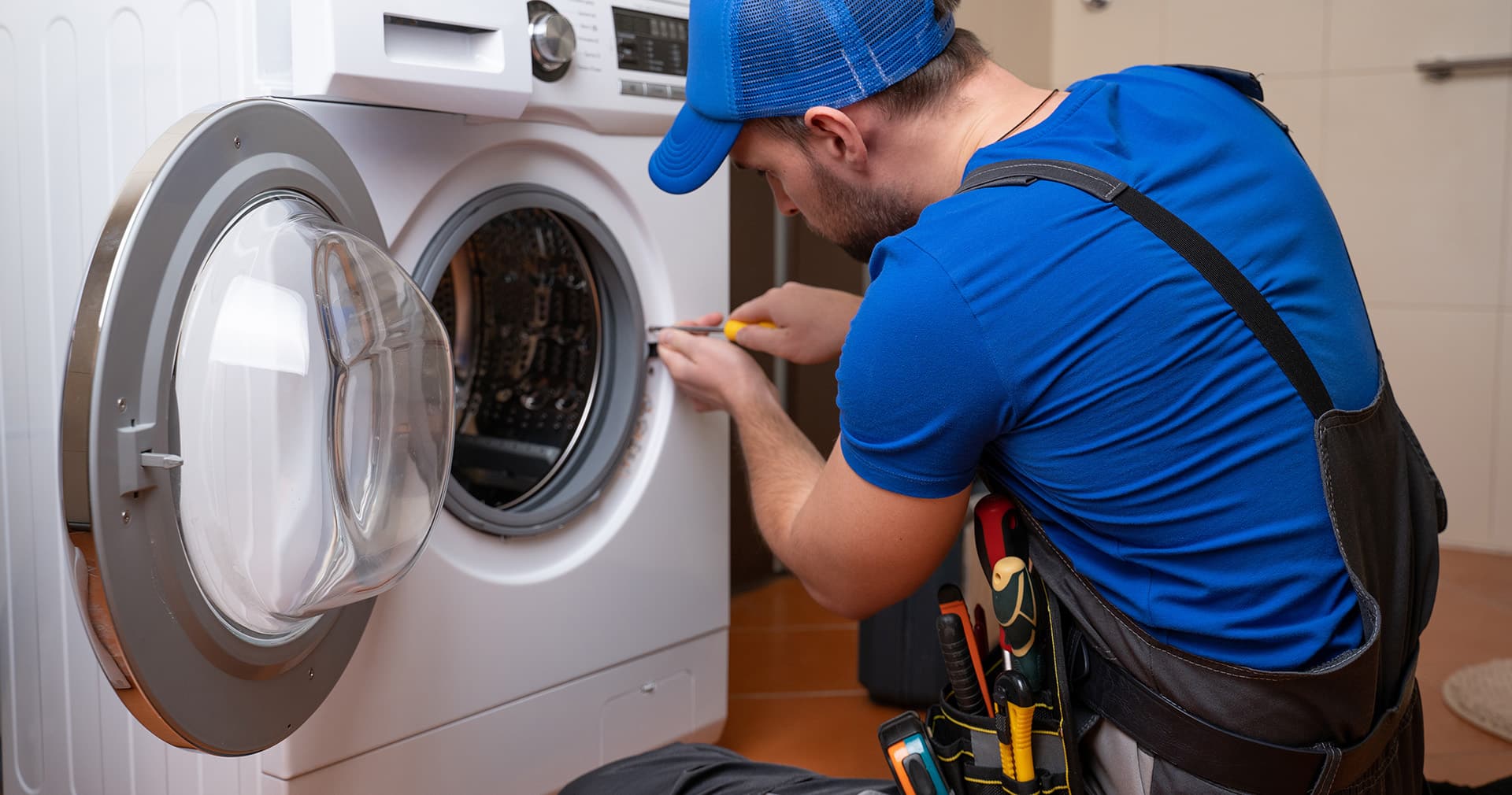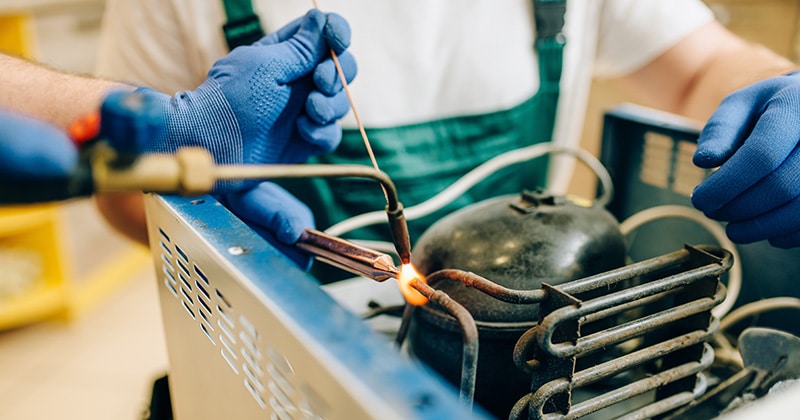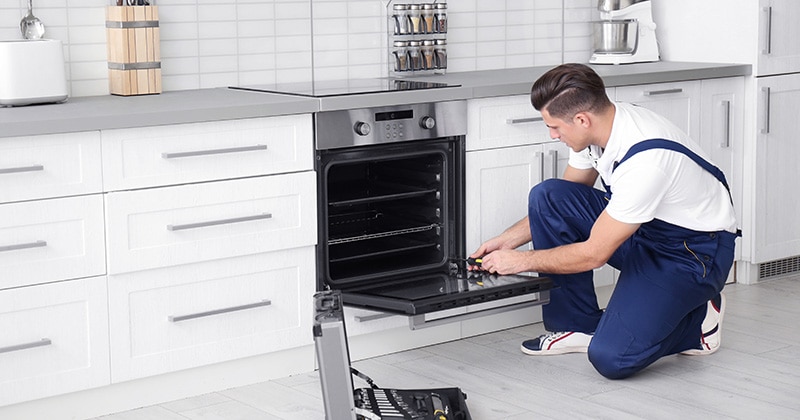
Are you thinking of becoming an appliance technician? You’re on the right track. Appliance repair is a great career path.
If you have a knack for fixing problems and tinkering with electronics, appliance repair might just be the job for you. It’s a fulfilling and noble trade for those who enjoy hands-on problem-solving.
Moreover, appliance repair is a relatively secure profession. Appliance technician jobs are in high demand across the US. In fact, now is the perfect time to get into the trade.
But is it lucrative? That’s probably one of the big questions on your mind.
And it’s a valid consideration, too, when switching professions. The salary figures should tell you whether a career in appliance repair is worth it.
So, how much do appliance repair technicians make?
This article has the answer. Read on as we discuss the following points:
- The average salary of appliance repair technicians in the US
- How appliance repair technician training and certification impact earning potential
- Specializations within the appliance repair profession
- Outlook of the appliance repair trade
- Quick tips to get started in appliance repair
Let’s dive in.
Average Salary of Appliance Repair Technicians
We’ll start by looking at the average salaries for appliance repair technicians. This should give you a ballpark figure of what appliance repair technicians earn.
According to ZipRecruiter, appliance technicians make anywhere between $12.74 and $36.54 in hourly wages. However, most repair technicians earn $19.23 to $27.88 an hour. The mean average wage is $24/hour, which amounts to $50,661 per year.
Why such a wide range of salaries?
Well, salary variability is not necessarily a bad thing. The wide gap between the highest and the lowest earners suggests opportunities for increased pay.
Repair technician salaries vary mainly based on skill level and experience. As a newbie learning the trade, you’ll likely make less than the average wage. And as you work up the ranks, you’ll attract higher-paying jobs or roles.
Looking at data from the US Bureau of Labor Statistics (BLS) reveals some interesting trends. According to the BLS, home appliance repairers earn, on average, $24.35/ hour. That’s on par with ZipRecruiter’s estimates. However, the BLS points out that earnings vary widely depending on location and specialization.
For instance, repairers working for the natural gas distribution industry can pocket as much as $43.01 an hour.
Additionally, some states are more lucrative for appliance repairers than others. At $28.91, New Jersey has the highest hourly mean wage for appliance repair technicians. Meanwhile, appliance repairers in Nebraska earn a mean wage of $17.52 an hour. That’s an astonishing $11.39/hour difference between the two states.
What can we learn from these figures?
Here’s one important takeaway:
The salary of an appliance repair technician is not set in stone. Your earning potential hinges on a number of factors, most of which are under your control.
For one, you can increase your earning potential by upskilling. Start off on a high skill level by learning the trade through formal training or hands-on apprenticeship. (More on this below.)
Secondly, consider the location. Practice the trade in a state, city, or town with a high demand for appliance repair technicians. That’s where you’ll earn the most, even as a rookie.
RELATED ARTICLE: How to Become an Appliance Repair Technician

The Financial Impact of Appliance Repair Training and Certificates
We’ve mentioned that skill level influences your earning potential as an appliance repair technician. Like with all trades, the higher your skill level, the more you earn.
The easiest way to learn appliance repair is through apprenticeship. Some appliance manufacturers, electrical companies, and home services contractors are always eager to hire helpers. As a helper, you’ll likely work under an experienced technician. There, you’ll earn appliance repair skills through on-the-job experience.
After about a year of working as a helper, you’ll have learned enough to take on repair jobs unsupervised. Technician apprenticeship normally takes six months to a year. But of course, the learning period varies from person to person. Also, some employers are keener than others to fast-track trainees into qualified technicians.
Alternatively, you could go for formal training. There are countless vocational training institutes offering world-class technician courses. But ideally, enroll with a school approved by the Professional Service Association (PSA) or the North American Equipment Dealers Association (NAEDA).
Appliance repair training typically takes one or two years, depending on the course.
NASTeC Certification
Whether you’ve trained through apprenticeship or formal education, you must pass a certification exam. You’ll need a NASTeC certificate to qualify as an appliance repair technician. NASTeC stands for National Appliance Service Technician Certification.
The International Society of Certified Electronics Technicians (ISCET) administers, scores, and analyzes NASTeC exams. NASTeC certification has four levels:
- Refrigeration and Air Conditioning*
- Cooking
- Laundry and Dishwashing
- Universal Technician (all three specialties plus basic skills)
*Requires proof of EPA Refrigerant Recovery Certification. Additionally, you will need state licensing to work as an HVAC technician.
To earn a NASTeC certification, you must pass the basic skills exam and at least one specialty exam.
Passing any of the three specialty exams gets you a “recognition of achievement.” After passing all four exams, you become a Certified NASTeC Universal Technician. That’s the highest level of recognition in the trade and also the highest paying.
EPA Technician Certification
The Environmental Protection Agency (EPA) also certifies appliance repair technicians. It approves technicians to work on appliances containing chlorofluorocarbons (CFC) refrigerants. The certifications are in accordance with Section 608 of the Clean Air Act.
CFCs are harmful to the environment. When released into the atmosphere, CFCs rise high in the stratosphere. Once there, they deplete the UV-protection ozone layer.
Naturally, technicians must be educated and tested on handling such hazardous chemicals.
The EPA awards four types of technician certifications:
- Type I — Servicing small appliances. Type I appliances fit a very specific description. They must be hermetically sealed, factory charged, and contain 5 lb. or less of refrigerant.
- Type II — Servicing high-pressure appliances.
- Type III — Servicing low-pressure appliances.
- Universal — Servicing all types of CFC-refrigerated appliances.
You must pass all three exams to earn EPA’s Universal Technician Certification. The certification qualifies you to work on any refrigerated appliances. Having a universal certificate expands your job scope and earning capacity.
The Association of Home Appliance Manufacturers (AHAM) and North American Retail Dealers Association (NARDA) award a similar certification. The NARDA/AHAM TYPE I CFC Certification is for technicians who recover refrigerant from Type 1 appliances. Again, this certification unlocks refrigerant-related jobs, widening your job pool and earning potential.
PSA Certification
The Professional Service Association (PSA) offers five types of technician certifications:
Certified Master Technician
A Master Certification awards excellence in the following areas:
- Consumer relations
- Core skills
- Cooling appliances
- Convenience appliances
- Cleaning appliances
- Cooking appliances (gas)
- Cooking appliances (electric)
- Cooking appliances (microwave)
Master Technician Certification is pretty demanding. You must complete all eight skill modules with a passing grade of at least 75%.
Certified Technician
To become a Certified Technician, you must pass at least three skill modules. The first two, the Core and Consumer modules, are mandatory. For the third module, you can choose any one you like.
In addition to the Core and Consumer modules, you’ll be certified in any other module you pass.
Certified Graduate Technician
This certification is awarded to vocational institution graduates after they pass their exams. It certifies the completion of formal appliance repair training in PSA-approved schools.
After working in the trade for two years, you can go for a Master Technician Certificate. But you’ll, of course, have to pass the Master Technician exam first.
Certified Consumer Specialist
This certification is primarily meant for non-technical personnel. Although, there’s no harm in getting it. In fact, it might come in handy should you choose to become an independent technician.
It awards excellence in people skills, morals, and ethics.
Certified Service Manager
This certification recognizes the skills needed to provide support in service management. It certifies that the holder can handle management tasks. In this case, management tasks span from employee/customer relations and marketing to financial management.
PSA technician certifications expand your job scope. You’ll definitely earn more as a Certified Master Technician than, say, just a Certified Technician. Plus, you could dabble in non-technical skills such as business management. Such additional skills are always a plus on your resume and pay slip.
Here’s a final pro tip: managing an appliance repair business is so much easier with appliance repair software. They may not teach you this in school, but it’s very true.

Specialization Within Appliance Repair
Technician specialization is a big deal. But let’s get the basics out of the way first.
What exactly does an appliance repair technician do?
You’ll likely travel to people’s homes, commercial establishments, schools, and hospitals to fix broken appliances. For most appliance repair technicians, that’s what the job entails. Alternatively, you can work in-house at an appliance manufacturing plant or distribution outlet.
Most appliance repair technicians specialize in one type of appliance. For instance, one can specialize in smart appliances, entertainment appliances, or kitchen appliances. Meanwhile, some technicians focus on products from a single manufacturer.
Does technician specialization affect earnings?
Yes, and in a big way.
Different specializations have different complexities. Some repair work may require specialized knowledge, skills, or tools. The higher the job’s complexity, the more you can charge for repair services.
Here’s a look at four main appliance repair specializations and how they affect earnings:
RELATED ARTICLE: What Is an HVAC Technician’s Salary?
Residential Appliance Repair Technician
Residential appliance repair technicians install, service, and fix household appliances. These are your everyday refrigerators, washing machines, ovens, sound systems, etc.
This is the most common appliance repair specialization. In other words, the space is pretty crowded. So, you’ll likely earn the average base salary of an appliance repair technician.
Commercial Appliance Repair Technician
Commercial appliance repairers work on commercial appliances. These are the sorts of appliances you’ll find in restaurants, schools, offices, laundromats, etc.
Appliances built for commercial use are larger and more complex. These require specialized knowledge and skills to repair. Technicians must also take extra care and precautions when handling commercial appliances.
As you might have guessed, commercial technicians earn more than residential technicians. It’s hard to say exactly how much more, as the pay difference will depend on the complexity of each job.
Factory Appliance Repair Technician
These are technicians who specialize in particular appliance brands. Usually, they go for major brands such as Samsung, LG, GE, and Phillips.
To become a factory appliance technician, you must be trained on that particular brand of appliances. Other requirements may include passing an exam, certification, or endorsement.
Working as a factory appliance repair technician is a pretty rewarding gig. The pay is exceptionally high when working under the manufacturer themself. Job listings for brand specialists promise as much as $72/hour.
Medical Appliance Repair Technician
This specialization deals with clinical equipment and appliances.
You have to jump through several hoops to become a medical appliance technician. First, you’ll need a host of skills and certifications in biomedical technology. Also, it takes a while to learn the trade.
But despite being a demanding profession, it may not be as rewarding as you might expect. A medical appliance repair technician’s average hourly wage is $20. That’s below the industry’s national average of $24/hour.

National Outlook of the Appliance Repair Industry
Salaries aside, is appliance repair a stable industry?
You certainly don’t want to gamble with your career. So, ensure you understand the industry before you take that leap.
Fortunately, appliance repair is a thriving industry. Appliance repair jobs are here to stay, as these industry stats confirm:
- The US appliance repair market has grown at a 1.9% compound annual growth rate (CAGR) over the past five years. Its estimated value in 2024 will be $6.5 billion. (IBISWorld)
- The industry is home to 36,004 businesses and employs 58,440 employees. (IBISWorld)
- Over 17,000 new appliance repair jobs are projected over the next 10 years. (Zippia)
So, what’s keeping this industry afloat?
There are three main reasons for a flourishing and future-proof appliance repair market:
- We have more tech in our homes and businesses today than ever before. For example, you’ll find smart appliances everywhere you look. These sophisticated devices need skilled people to ensure they run smoothly.
- The shift toward sustainable practices raises the demand for repair services. Sustainability ethos, such as e-waste reduction and resource conservation, favor appliance repairers.
- People are becoming more aware of the benefits of repairing appliances. The consumerist culture in the US is slowly dying down. Americans are becoming more cautious with their spending. “Repair, not replace” is a big part of this new-found cautious spending.
RELATED ARTICLE: Marketing Your Appliance Repair Business: 10 Ideas that Work
Appliance Repair: First Steps to Take
- Enroll in appliance repair apprenticeship or vocational training.
- Start gathering as many technician certifications as possible.
- Choose an appliance repair specialization that aligns with your income goals.
- Consider working in a state, city, or town paying high wages for appliance repair services.
- Continue learning new skills and tech trends on the job.
Related Posts
Stay Informed
Get the latest news and insights plus, Service Fusion offers and updates.Thank you for your submission.
SHARE